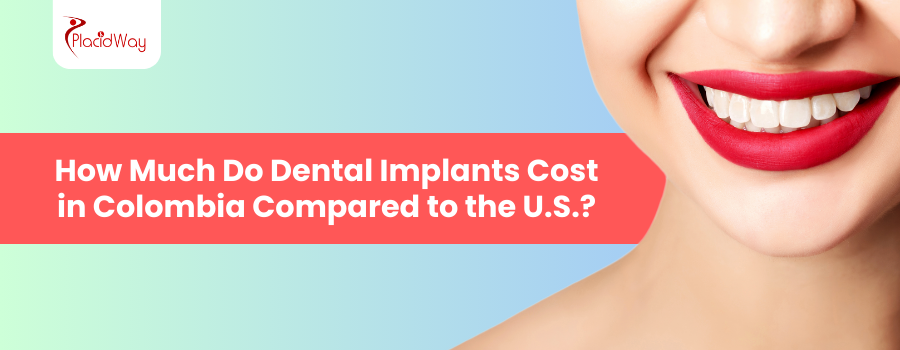Understanding the Cost and Benefits of Dental Implants in Colombia

Considering dental implants to restore your smile and confidence? You might be wondering, "How much do dental implants cost in Colombia?" The great news is that Colombia has emerged as a leading destination for high-quality, affordable dental implants, often costing significantly less than in countries like the US, Canada, or the UK. This comprehensive guide will walk you through everything you need to know about getting dental implants in Colombia, from the cost to the quality of care.
We understand that the decision to get dental work done, especially in another country, comes with many questions. In this post, we'll address the common queries people have about dental implants in Colombia, providing concise answers first, followed by more detailed explanations to give you a clear picture. Our aim is to offer expert, trustworthy information to help you make an informed choice.
How much do dental implants cost in Colombia?
"Dental implants in Colombia typically cost between $590 and $1,600 USD per implant, including the implant, abutment, and crown. This is significantly lower than in many Western countries."
The cost of dental implants in Colombia is a major draw for many international patients. While a single dental implant in the United States can cost anywhere from $3,000 to $5,000 or even more (once you factor in the crown and abutment), you can achieve the same, if not better, results in Colombia for a fraction of that price. The exact cost will depend on various factors, which we'll delve into, but patients often report savings of up to 70% without compromising on quality. This affordability makes dental tourism in Colombia an incredibly attractive option.
These lower costs are not due to inferior materials or a lower standard of care. Instead, they are generally attributed to lower overhead costs, including rent, salaries, and operational expenses in Colombia compared to more developed economies. This allows Colombian dental clinics to offer competitive pricing while still using internationally recognized implant brands and advanced technology.
What is the average cost of a single dental implant in Colombia?
"The average cost for a single dental implant in Colombia, including the titanium implant, abutment, and a porcelain crown, ranges from approximately $800 to $1,200 USD."
This price range is an estimate for a standard single tooth replacement. It’s important to remember that this can fluctuate based on the specifics of your case. For instance, if you require a zirconia implant (which is tooth-colored and metal-free), the cost might be slightly higher, typically ranging from $1,500 to $2,000 USD per implant. Despite this, it's still considerably more affordable than in many other countries where a single implant procedure can be prohibitively expensive.
When getting a quote, ensure it includes all components: the implant itself (the titanium post), the abutment (the connector piece), and the final crown (the prosthetic tooth). Some initial low quotes might only cover the implant post, so clarity is key. Reputable clinics in Colombia are usually transparent about their pricing.
What is the price range for full mouth dental implants in Colombia?
"For full mouth dental implants in Colombia, such as All-on-4 or All-on-6 solutions, prices typically range from $6,300 to $15,000 USD per arch. This can be up to 60-70% cheaper than in the U.S. or Canada."
Full mouth restoration often involves procedures like All-on-4 dental implants (four implants supporting a full arch of teeth) or All-on-6/8 (six or eight implants for greater stability). In Colombia, an All-on-4 procedure can cost between $6,300 and $12,000 per arch, while All-on-6 or All-on-8 systems might range from $10,000 to $15,000 per arch. For individual implants replacing each tooth in a full mouth scenario (which is less common but sometimes necessary), the cost could be between $20,000 and $30,000 for both arches.
These significant savings make comprehensive smile makeovers accessible to many who might not be able to afford them in their home countries. Even when factoring in travel and accommodation, the overall cost for full mouth dental implants in Colombia often remains substantially lower.
What factors influence the cost of dental implants in Colombia?
"Several factors influence the cost of dental implants in Colombia, including the number of implants needed, the type and material of the implant and crown (e.g., titanium vs. zirconia), the dentist's experience, clinic location, and any additional procedures required like bone grafts or sinus lifts."
Let's break down these factors:
- Number of Implants: Naturally, the more implants you need, the higher the overall cost. A single implant will cost less than multiple implants or a full mouth reconstruction.
- Implant and Crown Material: Titanium implants are the most common and are very biocompatible and durable. Zirconia implants, a metal-free alternative, are aesthetically superior for front teeth but tend to be more expensive due to manufacturing costs. Similarly, the material for the crown (e.g., porcelain-fused-to-metal, all-porcelain, zirconia) will affect the price.
- Dentist's Expertise and Clinic Reputation: Highly experienced implantologists or specialists (like periodontists or maxillofacial surgeons) working in renowned clinics with advanced technology might charge more. However, even their top-tier services are often more affordable in Colombia.
- Location of the Clinic: Clinics in major cities like Bogotá, Medellín, or Cartagena might have slightly different price points, but competition generally keeps prices attractive.
- Preliminary Procedures: If you require additional treatments before implant placement, such as tooth extractions, bone grafts (to increase jawbone density), or sinus lifts (for upper jaw implants), these will add to the total cost. A bone graft can range from $500 to $1,500, and a sinus lift from $1,000 to $2,500, depending on complexity.
- Technology Used: Clinics employing advanced technology like 3D intraoral scanners, CAD/CAM systems for crown manufacturing, and computer-guided surgery might have slightly higher costs, but this often translates to more precise and efficient treatment.
Are dental implants in Colombia good quality?
"Yes, dental implants in Colombia are generally of high quality. Many Colombian dentists are internationally trained, use globally recognized implant brands (like Straumann or Neodent), and operate in clinics with state-of-the-art technology and strict hygiene protocols."
Colombia has invested significantly in its healthcare infrastructure, and its dental sector is no exception. Many dentists pursue postgraduate training in countries like the USA, Europe, or Brazil, bringing back advanced skills and knowledge. Clinics catering to international patients often seek accreditations and adhere to international standards of care and sterilization.
The materials used for dental implants in Colombia, such as medical-grade titanium or zirconia, are often the same high-quality brands used in the US and Europe. Patients can expect durable, biocompatible implants that integrate well with the jawbone. It's always advisable to ask your chosen clinic about the brands they use and their success rates.
Is it safe to get dental implants in Colombia?
"Yes, getting dental implants in Colombia is generally safe, provided you choose a reputable clinic and qualified dental professionals. Colombian dental clinics catering to international patients often follow stringent health regulations and international safety protocols."
Safety is a paramount concern, and rightfully so. Reputable dental clinics in Colombia prioritize patient safety by maintaining high sterilization standards, using modern diagnostic tools (like 3D X-rays and CT scans), and employing experienced specialists. Many clinics also have English-speaking staff to ensure clear communication, which is crucial for a safe and successful treatment experience.
To ensure safety, do your research: check clinic reviews, dentist credentials, and ask about their infection control measures. A virtual consultation can also help you gauge the professionalism of the clinic.
What is the dental implant procedure in Colombia like?
"The dental implant procedure in Colombia typically involves an initial consultation and planning, surgical placement of the implant(s), a healing period (osseointegration), and finally, the placement of the abutment and crown. Some clinics offer immediate load implants where temporary teeth are placed the same day."
The process generally unfolds in these stages:
- Initial Consultation and Planning: This involves a thorough examination, X-rays or 3D CT scans to assess your jawbone, and a discussion of your treatment plan. Your dentist will explain the procedure, costs, and timeline.
- Implant Placement: This is a surgical procedure where the titanium implant (a small screw-like post) is placed into your jawbone. It's usually done under local anesthesia, though sedation options may be available.
- Osseointegration (Healing Period): After placement, the implant needs time to fuse with your jawbone. This healing process, called osseointegration, typically takes 3 to 6 months. During this time, you might have a temporary tooth or denture.
- Abutment Placement: Once osseointegration is complete, a small connector called an abutment is attached to the implant. This may require a minor second procedure or can sometimes be done during the initial surgery.
- Crown Placement: Finally, a custom-made crown (the artificial tooth) is attached to the abutment, restoring the look and function of your natural tooth.
Some advanced techniques, like strategic implantology with immediate loading, allow for the placement of implants and temporary fixed teeth in a single visit, often within a few days. This can reduce overall treatment time and the number of surgeries.
How long does the dental implant process take in Colombia?
"The entire dental implant process in Colombia can take anywhere from a few days (for immediate load implants with temporary crowns) to several months (for traditional implants requiring a healing period). This typically involves two trips if a significant healing period is needed."
For traditional dental implants, two trips to Colombia are usually required.
- First Trip (typically 7-10 days): This visit includes the initial consultation, diagnostics, and the surgical placement of the dental implant(s). If necessary, bone grafts or extractions may also be done during this trip.
- Healing Period (3-6 months): You'll return home for the osseointegration period, allowing the implant to fuse with your jawbone.
- Second Trip (typically 7-14 days): This visit is for placing the abutment (if not done already) and the final permanent crown(s) or bridge.
Some clinics offer "immediate load" or "same-day implants," especially for All-on-4 procedures, where a temporary prosthetic is placed shortly after the implants. The permanent prosthesis is then fitted after the full healing period. This allows patients to leave with functional teeth after their first visit. Discuss with your dentist if you are a candidate for this approach.
Do I need a bone graft for dental implants in Colombia?
"Whether you need a bone graft for dental implants in Colombia depends on the density and volume of your jawbone. If there isn't enough bone to securely support an implant, a bone graft will be necessary, which can add to the cost and treatment time."
A bone graft is a procedure to augment or rebuild bone in your jaw where it has been lost or is insufficient. This is often necessary if you've had missing teeth for a long time (leading to bone resorption), gum disease, or trauma. Your Colombian dentist will use X-rays or a CT scan to assess your bone quality.
If a bone graft is needed, it's typically done before or at the same time as implant placement. The graft material can be your own bone, donor bone, or a synthetic material. This procedure adds to the overall treatment timeline, as the graft needs time to integrate (usually 3-6 months) before an implant can be placed or loaded. The cost of a bone graft in Colombia can range from $500 to $1,500 USD, depending on the extent of the graft needed.
What are the types of dental implants offered in Colombia?
"Clinics in Colombia offer various types of dental implants, primarily endosteal implants (placed directly into the jawbone) made of titanium or zirconia. They also provide solutions like All-on-4, All-on-6, and mini dental implants for different patient needs."
The most common types include:
- Endosteal Implants: These are the most frequently used type, surgically inserted directly into the jawbone. They are typically made of titanium, known for its biocompatibility and strength.
- Zirconia Implants: A metal-free alternative, these are made from ceramic material. They offer excellent aesthetics, especially for front teeth, as they are white and eliminate the risk of a metallic hue showing through the gums. They can be slightly more expensive than titanium.
- All-on-4 / All-on-6 / All-on-8 Implants: These are full-arch rehabilitation solutions where four, six, or eight implants are used to support an entire denture or bridge. This is a popular option for patients missing most or all of their teeth.
- Mini Dental Implants (MDIs): These are smaller diameter implants that are sometimes used to stabilize lower dentures or in cases with limited bone width. They are less invasive but may not be suitable for all situations.
Your dentist in Colombia will recommend the best type of implant based on your specific oral health condition, the location of the missing tooth/teeth, bone density, and aesthetic goals.
How do I choose a good dentist for implants in Colombia?
"To choose a good dentist for implants in Colombia, look for qualifications and experience (especially in implantology), read patient reviews and testimonials, check clinic accreditations and technology, ensure they use high-quality materials/brands, and opt for clinics with English-speaking staff for clear communication."
Here’s a checklist for finding a reliable dental professional:
- Credentials and Specialization: Look for dentists who are specialists in implantology, periodontics, or oral and maxillofacial surgery. Verify their education, training (especially international), and years of experience.
- Patient Reviews and Before/After Photos: Search for reviews on independent platforms, forums, and the clinic’s website. Before-and-after photos of previous implant cases can also give you an idea of their work.
- Clinic Standards and Technology: Choose clinics that are modern, well-equipped with advanced diagnostic tools (e.g., 3D CT scanners, intraoral cameras), and follow international hygiene and sterilization protocols.
- Materials and Implant Brands: Inquire about the brands of implants they use (e.g., Straumann, Nobel Biocare, Zimmer Biomet, Neodent are reputable brands) and the materials for crowns.
- Communication: Ensure the dentist and staff can communicate effectively in your language, or that translation services are available. Clear understanding is crucial for treatment success.
- Virtual Consultation: Many clinics offer virtual consultations, allowing you to discuss your case, ask questions, and get a preliminary assessment and quote before traveling.
- Transparency in Pricing: Get a detailed treatment plan with a clear breakdown of costs, including any potential additional procedures.
What are the benefits of getting dental implants in Colombia?
"The primary benefits of getting dental implants in Colombia include significant cost savings (up to 70%), access to high-quality dental care with experienced professionals and modern technology, the use of internationally recognized implant brands, and the opportunity to combine treatment with a visit to a beautiful country."
Patients choose Colombia for dental implants due to:
- Affordability: As discussed, the cost is a major advantage.
- High Standard of Care: Colombian dentists are often highly skilled, many with international training, and clinics are well-equipped.
- Advanced Technology and Materials: Access to the same advanced techniques and high-quality materials used in more expensive countries.
- Experienced Specialists: A growing pool of specialists in implant dentistry.
- Dental Tourism Experience: Colombia is a vibrant country with rich culture, beautiful landscapes, and welcoming people. Many patients enjoy exploring cities like Medellín, Bogotá, or Cartagena during their dental trip.
- Personalized Attention: Clinics catering to international patients often provide excellent customer service, including assistance with travel arrangements and accommodation.
Are there risks involved with dental implants in Colombia?
"Yes, like any surgical procedure, dental implants in Colombia (or anywhere) carry some risks, though they are generally low. These include infection, implant failure, nerve damage, sinus issues (for upper implants), or complications from anesthesia. Choosing an experienced surgeon and following post-operative care instructions minimizes these risks."
While dental implant surgery has a high success rate (often above 95%), potential risks include:
- Infection at the implant site: This can usually be treated with antibiotics.
- Implant failure (osseointegration failure): The implant may not properly fuse with the jawbone. This is more common in smokers or those with certain medical conditions.
- Nerve damage: This can cause pain, numbness, or tingling in your natural teeth, gums, lips, or chin. It's rare when procedures are planned carefully using 3D imaging.
- Sinus problems: If implants placed in the upper jaw protrude into the sinus cavity, it can cause issues.
- Peri-implantitis: Inflammation of the gums and bone around the implant, similar to gum disease.
- Allergic reaction: Very rare, but possible with certain materials.
A thorough pre-operative assessment by your Colombian dentist, precise surgical technique, and diligent adherence to post-operative care instructions are crucial for minimizing these risks. Reputable clinics will discuss these potential complications with you before the procedure.
What is the recovery like after dental implant surgery in Colombia?
"Recovery after dental implant surgery in Colombia involves some swelling, bruising, and discomfort for a few days, manageable with pain medication and cold compresses. Most patients can resume normal, non-strenuous activities within a day or two, with a soft food diet recommended initially."
Immediately after the surgery, you can expect:
- Pain and Discomfort: Manageable with prescribed or over-the-counter pain relievers.
- Swelling and Bruising: Common around the mouth, cheeks, and sometimes eyes. Cold packs can help reduce this.
- Minor Bleeding: Some oozing from the surgical site is normal for the first 24 hours.
- Diet: A soft food diet is usually recommended for the first week or so to avoid putting pressure on the new implants.
Your Colombian dental clinic will provide detailed post-operative instructions, which typically include:
- Oral hygiene practices (e.g., gentle rinsing, careful brushing).
- Medications (antibiotics to prevent infection, pain relievers).
- Dietary restrictions.
- Activity limitations (avoiding strenuous exercise for a short period).
- Follow-up appointments.
Full healing and integration of the implant into the jawbone take several months, but the initial surgical recovery is usually relatively quick.
What popular cities in Colombia are known for dental implants?
"Popular cities in Colombia known for high-quality dental implants and dental tourism include Medellín, Bogotá, Cartagena, Cali, and Barranquilla. These cities have well-established dental clinics with experienced professionals catering to international patients."
- Medellín: Known as the "City of Eternal Spring," Medellín is a hub for medical and dental tourism, boasting numerous modern clinics with highly skilled dentists and advanced technology. It offers a pleasant climate and vibrant culture.
- Bogotá: As the capital city, Bogotá has a wide range of world-class dental facilities and specialists. It's a bustling metropolis with many cultural attractions.
- Cartagena: This historic coastal city is popular for combining dental treatment with a Caribbean vacation. It offers excellent clinics along with beautiful beaches and colonial architecture.
- Cali: Known for its salsa dancing and medical tourism, Cali also has a growing reputation for quality dental care at affordable prices.
- Barranquilla: Another coastal city, Barranquilla is also developing its dental tourism sector, offering competitive options for dental implants.
When choosing a city, consider factors like clinic reputation, ease of travel, your personal preferences for environment (city vs. coast), and overall costs including accommodation and living expenses.
Ready to explore your options for dental implants in Colombia and achieve the smile you've always wanted? PlacidWay can help you connect with trusted and accredited dental clinics in Colombia. We offer comprehensive information, patient reviews, and assistance in planning your dental journey.
Explore PlacidWay today to find top-quality, affordable dental implant solutions in Colombia and take the first step towards a renewed smile and confidence!






.png)

.png)
.png)




